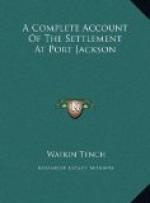Our survey commenced on the north side of the river. Dod says he expects this year’s crop of wheat and barley from the fifty-five acres to yield full 400 bushels. Appearances hitherto hardly indicate so much. He says he finds the beginning of May the best time to sow barley,* but that it may continue to be sown until August. That sown in May is reaped in December; that of August in January. He sowed his wheat, part in June and part in July. He thinks June the best time, and says that he invariably finds that which is deepest sown, grows strongest and best, even as deep as three inches he has put it in, and found it to answer. The wheat sown in June is now turning yellow; that of July is more backward. He has used only the broad-cast husbandry, and sowed two bushels per acre. The plough has never yet been tried here; all the ground is hoed, and (as Dod confesses) very incompetently turned up. Each convict labourer was obliged to hoe sixteen rods a day, so that in some places the earth was but just scratched over. The ground was left open for some months, to receive benefit from the sun and air; and on that newly cleared the trees were burnt, and the ashes dug in. I do not find that a succession of crops has yet been attempted; surely it would help to meliorate and improve the soil. Dod recommends strongly the culture of potatoes, on a large scale, and says that were they planted even as late as January they would answer, but this I doubt. He is more than ever of opinion that without a large supply of cattle nothing can be done. They have not at this time either horse, cow, or sheep here. I asked him how the stock they had was coming on. The fowls he said multiplied exceedingly, but the hogs neither thrived or increased in number, for want of food. He pointed out to us his best wheat, which looks tolerable, and may perhaps yield 13 or 14 bushels per acre**. Next came the oats which are in ear, though not more than six inches high: they will not return as much seed as was sown. The barley, except one patch in a corner of a field, little better than the oats. Crossed the river and inspected the south side. Found the little patch of wheat at the bottom of the crescent very bad. Proceeded and examined the large field on the ascent to the westward: here are about twenty-five acres of wheat, which from its appearance we guessed would produce perhaps seven bushels an acre. The next patch to this is in maize, which looks not unpromising; some of the stems are stout, and beginning to throw




